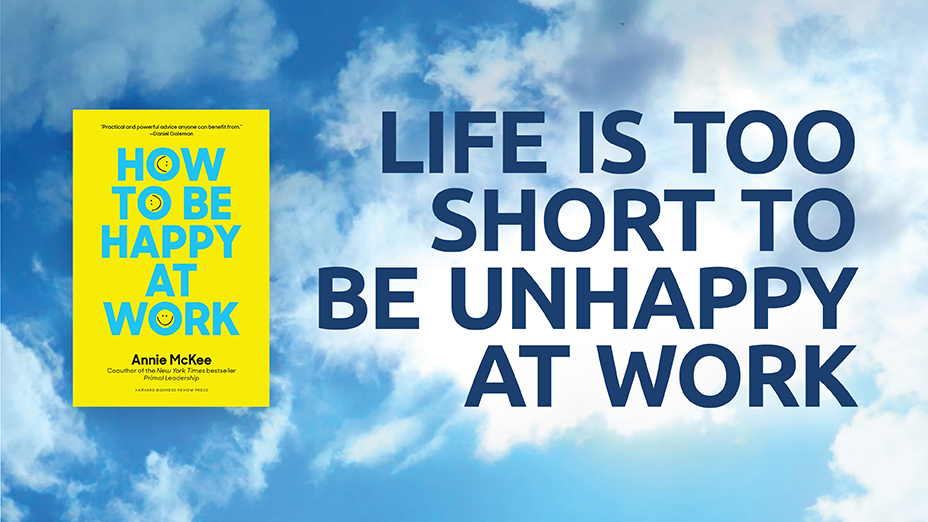Life really is too short to be unhappy at work. Yet far too many of us aren’t even close to being content—much less delighted—with our work or our workplaces. Instead, we are stressed and exhausted. We can’t remember what we used to love about our jobs. Colleagues we trust and respect are few and far between, and half the time it doesn’t even feel safe to be ourselves. All of this is spilling over into our personal lives. We’re having a hard time sleeping or have given up on exercise. Relationships are suffering, too. We feel trapped and struggle to see how things will get better. No one wants to live like this. Still, a lot of us give up and settle for less-than-fulfilling jobs. We tell ourselves that we’re not supposed to be happy at work; that’s for other parts of life. We try to cope by avoiding that bad manager or getting that stubborn, annoying person off the team. We shut down, give less, and fantasize about telling someone off. Sometimes we run away from the job, the company, even our careers. But running away isn’t going to make things better. To be happy, I’ve discovered, you’ve got to run toward something: meaningful work; a hopeful, inspiring vision of your future; and good relationships with the people you work with every day.
Happiness Begins with Purpose and Meaningful Work
We are wired to seek meaning in everything we do. It’s what makes us human. In some cases, it’s what keeps us alive. In his classic book, Man’s Search for Meaning, Austrian psychiatrist and holocaust survivor Victor Frankl shows that even in the worst of circumstances, purpose, hope, and connection are what keep us going. True, his story of finding good in evil and pursuing a noble purpose in spite of the horrors of life in concentration camps is nothing short of heroic. Yet, as Frankl so eloquently shows us, we strive to find meaning in our day-to-day lives no matter where we are or what conditions we are subjected to. As you have probably discovered, you can easily lose sight of what you value and ignore the aspects of yourself that matter most to you, especially when you’re struggling with dysfunctional organizations, bad bosses, and stress. You’re then likely to put meaning and purpose on the back burner or wait for someone else to give you a compelling reason to love your job. Couple all this with the outdated but pervasive notions that personal values don’t belong in the workplace, and you have a recipe for disengagement and unhappiness. You need the conviction to insist on living your purpose at work. As you will see in this book, the effort is worthwhile. Having a sound, clear, and compelling purpose helps you be stronger, more resilient, and able to tap into your knowledge and talents. As you discover which parts of your job are truly fulfilling—and which are soul destroying—you will be in a better position to make good choices about how you spend your time and what you pursue in your career.
Hope’s Contribution to Happiness
Like meaning, hope is an essential part of our human experience. This is as true at work as in any corner of our lives. Hope, optimism, and a vision of a future that is better than today help us rise above trials and deal with setbacks. Hope fuels energy, creativity, and resilience. Hope makes it possible to navigate complexity, deal with pressure, prioritize, and make sense of our crazy organizations and work lives. And hope inspires us to reach our potential— something virtually everyone wants for themselves. Unfortunately, we often assume that our organization’s vision is enough to keep us hopeful and focused on the future. I’ve rarely seen this to be the case. An organization’s vision, however inspiring, is for the organization—not you. Even the noblest organizational visions seldom speak to our most cherished, personal hopes and dreams. To be truly happy at work, we need to see how our work responsibilities and opportunities fit with a personal vision of our future. This kind of vision is vitally tied to hope and optimism, which we can, with focus and hard work, cultivate even in difficult jobs and toxic workplaces. When we see our jobs through a positive lens, and when a personal vision is at the front and centre in our minds, we are more likely to learn from challenges and even failures, rather than be destroyed by them. With hope, optimism, and a personal vision, we can actively choose a path toward happiness—a path away from disengagement, cynicism and despair.
Friendships and Happiness at Work
Resonant relationships are at the heart of collective success in our companies. That’s because strong, trusting, authentic relationships form the basis for great collaboration and collective success. But, I’ve found, we need more than trust and authenticity to get us through good times and bad. We need to feel that people care about us and we want to care for them in return. This, too, is part of our human makeup. We also want to feel as if we are accepted for who we are, and that we work in a group, team, or organization that makes us feel proud and inspires us to give our best effort. Adding it all up, the kind of relationships we want and need look a lot like friendships. Yet, one of the most pernicious myths in today’s organizations is that you don’t have to be friends with your coworkers. Common sense and my decades of work with people and companies show the exact opposite. Love and a sense of belonging at work are as necessary as the air we breathe. Purpose, hope, and friendships don’t just appear magically. You need to work for them. You need to engage in mindful self-reflection and be truthful about what you discover. Then you need to act. This is where your emotional intelligence comes in.
We’ve known for years that emotional intelligence (EI) is key to being effective at work. The more EI you have, the better you are at your job—no matter what kind of role you have or how senior you are. What’s clear to me now is that EI also affects your ability to find and sustain happiness. EI enables conscious reflection and action—that magic combination that keeps you from running from one unhappy situation to the next. In practical terms, EI is a set of competencies that enable you to understand your own and others’ feelings, and then use this knowledge to act in ways that support your own and others’ effectiveness. Moreover, EI will help you tune in to a purpose and hope to establish friendly, resonant relationships at work.
When you decide to look within yourself to connect with what’s most important to you, what makes you feel hopeful about the future, and what you long for in your relationships, you are taking that first, all-important step toward a work life that is deeply satisfying, challenging, and fun. With conviction and practice, you can be happy and successful— and love your work.
Life is Too Short to be Unhappy at Work




.png)


%20(1).png)

What Did You Think?